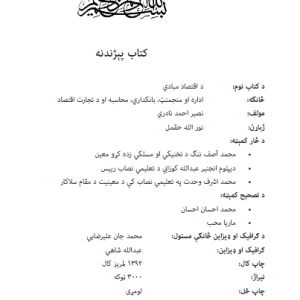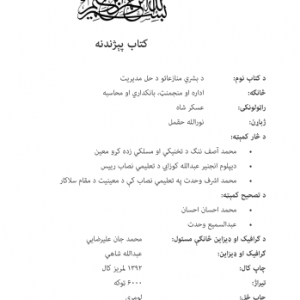About (دتولید مدیریت)Book: You can read short details of the book below. If you want to get for FREE please click on DOWNLOAD (دتولید مدیریت)button below, wait and it will start automatically.
Plato | Translation: Mutiullah Hotak
Among the students of Socrates, Plato also did not like democracy. Plato was a wise and wise man. He had a strong imagination and was never dissatisfied with his thoughts. Sometimes he looked down on his students. He promised to pass on the teachings of Socrates to future generations, of course it was not an easy task. Usually when the teacher leaves; He used to go to his house and try to write down the words of his teacher. According to the exact transcript, what the teacher had said was not important to him, so he would have had to add his own words in order to be able to explain those words. He described the sitting of Socrates as if a talented actor is portraying a scene on a stage. Therefore, Plato’s dialogues are like a documentary, emotional and fascinating movie.
Socrates would shake his head with a smile and say: “Eternal gods, how faithful this young man is to me!” After the death of Socrates, Plato left his main love, staying in Athens was threatening to him. Because he belonged to the elite of the former ruling class and his close relatives were plotting to overthrow democracy. He used to openly hate the leaders of the state council, such as merchants, ship workers, tanners and ship owners – who had sentenced Socrates to death. That’s why he despised Athens.
Will there be a country in the world whose citizens live under the shadow of true justice? Will there be knowledge that answers all questions and solves problems?
Plato went to Egypt by sea. Egyptian tradition and culture seemed strange to him. The Egyptian priests did not consider them to be the real lords of power. Only one thing was fair to him and that was that everyone in Egypt was thinking about his work. The industrialists were thinking about their business and the farmers were doing their farming. Landlords did not want to be artisans, and on the contrary, artisans did not want to have any position in the king’s court. In Athens, every farmer, cobbler and scholar could participate in the state council. But in Egypt, every soldier asked to interfere in the affairs of the government, that “was a natural gift given by God to the kings.” He would see severe punishment.
Plato considered the society to be ideal, such that farmers and artisans work in it, soldiers and philosophers are its protectors and govern it. This system, despite condemning most people to death and ignorance, was, in Plato’s view, more just than democracy/government by the people.
This prince did not think about ordinary people: “The government should not be a cobbler who does what he does and what happens to him.” The guardian is important, because the goal of the government is not the prosperity of the cobbler, its goal is only survival. According to Plato, the guardians were the best human beings, but according to him, they were not the noblest, honest and pure people: he said that the rulers have no right to lie to the people to protect the national interests and interests of their government. to give But if a businessman tells a lie or cheats someone, he should be punished. This was Plato’s idea of ”just government”.







Reviews
There are no reviews yet.